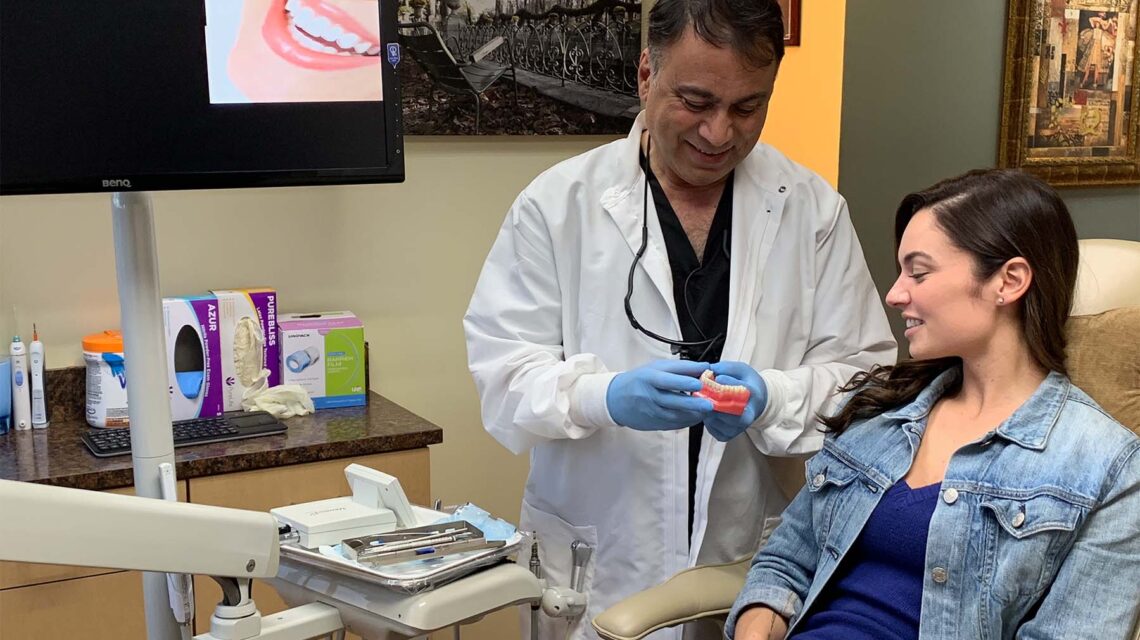At Smile Angels of Beverly Hills, we understand the complexities of oral health and the importance of addressing often-overlooked factors contributing to gum bone loss. This condition, which can significantly impact your dental well-being, is often a result of a combination of hidden and more obvious factors. In this article, we’ll explore these hidden elements that can lead to bone loss in your gums.
Table of Contents
Unseen Culprits of Gum Bone Loss
While the more common causes of gum bone loss like periodontal disease and tooth loss are well-known, there are several less obvious factors that can equally contribute to this condition.
- Nutritional Deficiencies: A diet lacking in essential nutrients like calcium and vitamin D can weaken the bones, including those supporting your teeth. This often-overlooked aspect of diet can silently contribute to bone deterioration in the gums.
- Medication Side Effects: Certain medications can have an adverse effect on your oral health. For instance, drugs used for osteoporosis, called bisphosphonates, can sometimes lead to a decrease in bone turnover, affecting the jawbone.
- Genetic Factors: Genetics play a crucial role in your overall health, including the health of your gums and teeth. Some individuals may be genetically predisposed to having weaker bone density, which can predispose them to gum bone loss.
- Hormonal Changes: Hormonal fluctuations, especially in women during pregnancy, menopause, or due to birth control pills, can affect gum health. These changes can make gums more sensitive and susceptible to bone loss.
Recognizing the Signs
Early detection of gum bone loss is key to preventing serious dental issues. Some signs to watch out for include:
- Receding Gums or the Appearance of Lengthened Teeth: This is one of the most noticeable signs of gum bone loss. When the gums recede, more of the tooth is exposed, making the teeth appear longer than usual. Gum recession happens because the supporting bone structure is diminishing, pulling the gum tissue away from the tooth. This exposure can lead to other complications, such as increased sensitivity and greater risk of decay on the root surfaces of the teeth.
- Increased Sensitivity to Hot and Cold: This symptom is directly related to gum recession and exposure of the tooth root. The root surface doesn’t have the hard enamel coating that covers the crown of the tooth, making it more sensitive to temperature changes. When hot or cold substances come into contact with these exposed areas, it can cause discomfort or a sharp pain, which is a clear sign of underlying issues with the gums and bones.
- Changes in the Way Your Teeth Fit Together When Biting: As bone loss progresses, it can affect the stability and position of the teeth. You might notice a change in your bite – that is, how your upper and lower teeth come together. These changes can occur gradually and can lead to further complications like difficulty in chewing, uneven wear of teeth, or even TMJ (temporomandibular joint) disorders.
Recognizing these signs is crucial for taking prompt action. Regular dental check-ups can help in early identification and management of these symptoms. If you notice any of these signs, it’s advisable to consult with a dental professional for a comprehensive evaluation and appropriate treatment.
Proactive Measures for Prevention
At Smile Angels of Beverly Hills, we advocate for a proactive approach to dental health:
- Balanced Diet: We emphasize the importance of a balanced diet rich in calcium, vitamin D, and other bone-strengthening nutrients.
- Regular Dental Check-ups: Routine visits allow us to monitor your oral health closely and catch any early signs of bone loss.
- Personalized Treatment Plans: Depending on your individual needs, we may recommend specific treatments or lifestyle changes to help prevent or slow down bone loss.
Dietary Factors Affecting the Prevalence and Impact of Periodontal Disease
Recent research has increasingly underscored the impact of dietary factors on periodontal health. A comprehensive review published on PubMed highlights the significant role of both macronutrients and micronutrients in influencing periodontal health and diseases. This study emphasizes that a balanced intake of unprocessed complex carbohydrates, vegetable proteins, omega-3 fatty acids, and essential vitamins and minerals can have a positive effect on reducing periodontal inflammation. Conversely, a diet high in refined carbohydrates, non-vegetable proteins, proinflammatory saturated fatty acids, and an imbalanced nutrient supply can exacerbate periodontal inflammation. The review suggests that a healthy and balanced diet not only has anti-inflammatory effects but also serves a protective role in maintaining periodontal health, indicating the importance of lifestyle and dietary choices in managing oral health conditions (Santonocito et al., 2021, “Dietary Factors Affecting the Prevalence and Impact of Periodontal Disease,” PubMed).
Your Partner in Oral Health
At Smile Angels of Beverly Hills, Bruce Vafa DDS., we are committed to providing our patients with comprehensive and personalized dental care. If you’re concerned about bone loss in your gums or any other dental issues, we are here to help. Our expert team, led by Dr. Vafa, uses the latest technology and techniques to ensure the best outcomes for our patients.
Contact us today to schedule an appointment or to learn more about how we can help you maintain optimal oral health.



